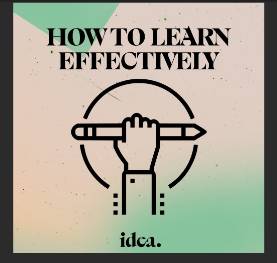Learning effectively is a skill that can transform academic,
personal, and professional growth. Whether you’re tackling a new subject,
preparing for exams, or expanding your skillset, here’s a guide to help make
learning easier and more impactful.
1. Set Clear Goals
Defining Objectives:
Establish clear, achievable goals for what you want to learn. Aiming for
clarity helps channel your focus, allowing you to better measure your progress.
For example, instead of a vague goal like "learn about psychology,"
set a specific objective, like "understand the basics of cognitive
psychology and memory processes."
Use the SMART
Method: This strategy — Specific, Measurable, Achievable, Relevant, and
Time-bound goals — can help make learning objectives realistic and motivating.
2. Understand How You
Learn Best
Each individual has
different learning preferences. Understanding your style can make your study
sessions far more productive:
- Visual Learners
benefit from charts, diagrams, and videos.
- Auditory Learners
retain more through discussions, lectures, and audio resources.
- Kinesthetic
Learners prefer hands-on activities or real-life application exercises.
Try Blended
Techniques: Often, combining visual, auditory, and kinesthetic elements
improves learning, especially for complex or layered topics.
3. Engage in Active
Learning
What is Active
Learning? It’s the process of engaging with content by questioning,
summarizing, and discussing it, rather than passively reading or listening.
Active learning strategies like self-quizzing, creating flashcards, or
summarizing notes reinforce information and improve recall.
- Teach Back: Try
to explain what you’ve learned to someone else, even if it’s yourself. This
method, known as the “Feynman Technique,†is effective because teaching
requires clarity of thought.
4. Use Spaced
Repetition
Research has shown
that reviewing material over intervals (spaced repetition) significantly enhances
long-term memory. Tools like Anki or Quizlet can automate this by reminding you
to review material just as you’re about to forget it. This technique
counteracts the forgetting curve, ensuring better retention over time.
5. Practice Retrieval
Rather than simply
rereading material, actively testing yourself improves memory and
understanding. Practicing retrieval through tests, quizzes, or even reciting
information from memory is more effective than passive review.
Self-Testing:
Create practice questions or test yourself on the main points of a topic to
reinforce your understanding and identify gaps.
6. Create a
Productive Study Environment
A clutter-free,
quiet environment minimizes distractions and maximizes focus. If total silence
isn’t ideal, try instrumental music or nature sounds to boost concentration.
Regular, brief study breaks can also prevent fatigue and increase productivity.
7. Leverage
Technology for Learning
Various online
tools and resources can simplify the learning process:
- Digital
Flashcards for spaced repetition.
- Note-taking Apps
(e.g., Notion, Evernote) for organized learning.
- Educational
Platforms like Coursera, Khan Academy, and YouTube offer free resources on
almost any topic.
8. Stay Consistent
and Practice Self-Care
Consistency is key.
Short, regular study sessions over time are more effective than cramming. Also,
adequate sleep, regular exercise, and a balanced diet directly support
cognitive function, making learning easier.
9. Stay Curious and
Reflect
Reflect on Progress:
Take time to review what you’ve learned and identify areas for improvement.
Reflecting on your learning journey builds a growth mindset and deepens
understanding.
In Summary, Learning effectively requires understanding your goals,
choosing the right methods, and staying consistent. By experimenting with
different techniques and reflecting on your progress, you can develop an approach
to learning that suits you best, setting you on the path to mastery in any
subject.
Embrace curiosity and keep experimenting with what works for
you — learning is a lifelong journey!






No comments yet
Be the first to share your thoughts!